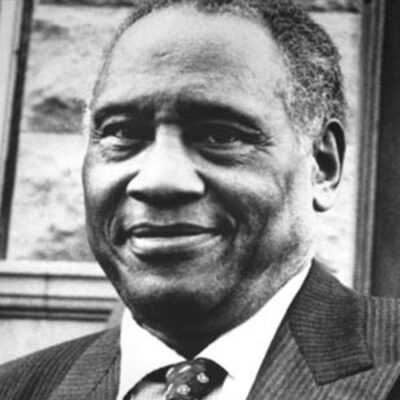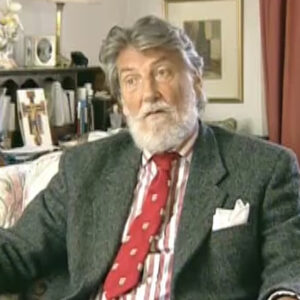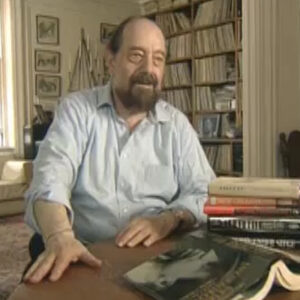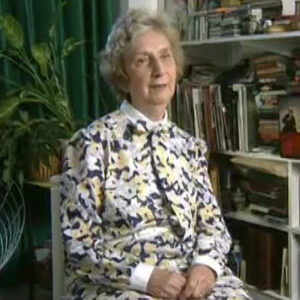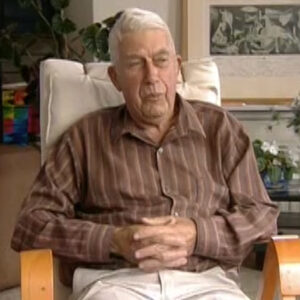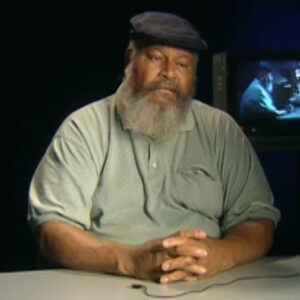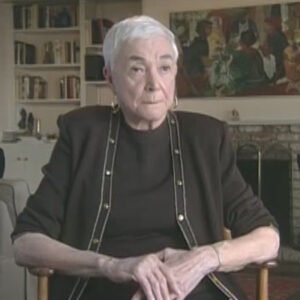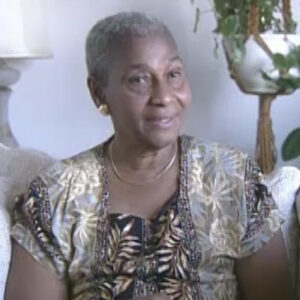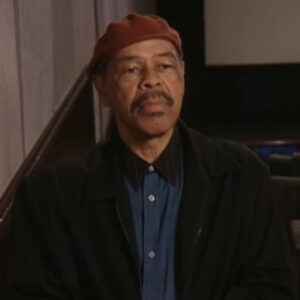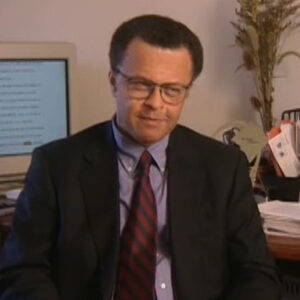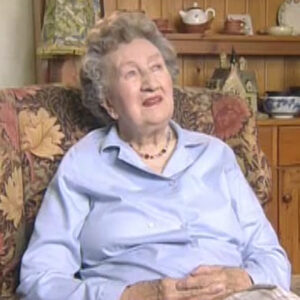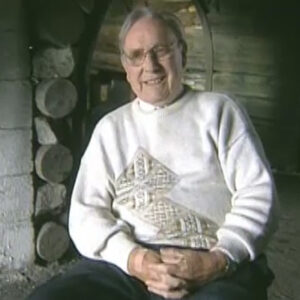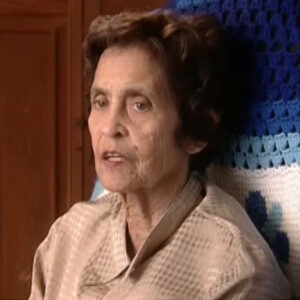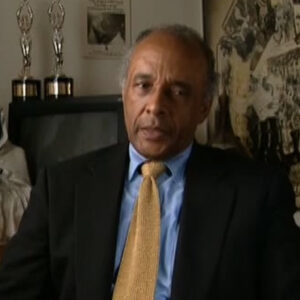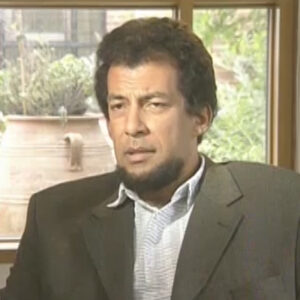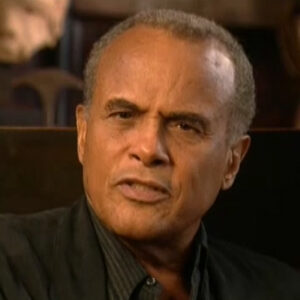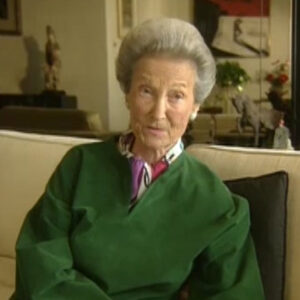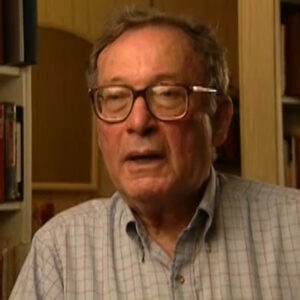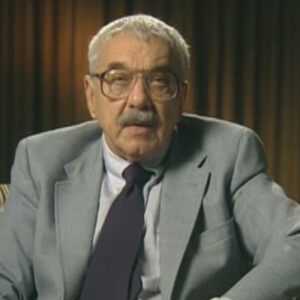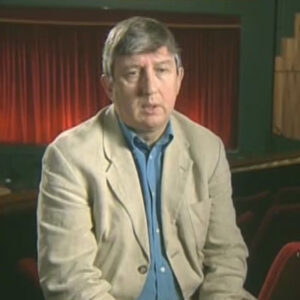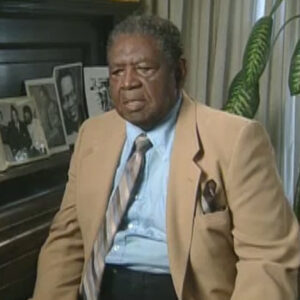Speaker Well, I was first the socialist, I was in the Young People’s Socialist League when I was about 20 years old, and one day I was down on the east side, Stenton Street, and I noticed a family being evicted, which a very common thing then. And somebody gave out leaflets saying they were members of the Young Communist League and they’re going to carry furniture up again. So I said she can I join you? And I said, sure. So I did join them. And as soon as I finished, while the sheriff was still there, they had the sheriff take it and the policeman just turned his back. The sheriff didn’t care because every time the furniture was carried back, they’d have to call him again and they made more money that way. So we carried the furniture up again, five flights. I was a very little guy, as you can see, and I carried the light stuff. And the funny part is I became very friendly with another guy and a young Communist League who was also a little guy like me. And we both carried up chairs and things like that. The next time I saw the guy was about six years later in Spain and the day after I met him, he was killed. Just a little thing. But that’s what got me to join the YSL when I saw that they were doing something instead of like a socialist. We just sat around and talked about it. And that’s why I joined the young communist.
Speaker How were you censored? But what were somebody says to you?
Speaker Why did you go to Spain? What’s your reaction? I mean, is it easy to tell people about that now?
Speaker Oh, I don’t know, because it’s a little more difficult because the people today don’t understand what we lived through in those days. The thing that actually played a big role in my going to Spain was.
Speaker OK, the thing that actually played a big role in starting I was moving the camera, I’m sorry, right?
Speaker We had if you wanted to see anything visual in the news, you had to go to the movie theater and you saw newsreels that usually took three or four or five minutes. And I remember one time being there and the rise of Hitler was the big thing. And I watched as these stormtroopers guys would start young men with swastikas on their sleeves and they were dragging an old man, a Jewish man from a store by the beard, and they flung them down to the ground. Then they spat on them and kicked them. And then they gave them a toothbrush with some soap and told to clean the street. And the poor guy had a lot of dignity. He didn’t show any emotion. He just did what he was told. And I had so much more respect for him going without showing fear and with dignity. And the other guys, I just took such a hatred for them. Cowards taken an old man like that and beating them up or not beating them up then, but treating them like an animal. Well, that was the thing that made a big effect on me sort of at one time when I was the helped organizer.
Speaker Women, start with you. Starting with you. You saw this in the movies? Yes, in a newsreel.
Speaker And I saw the same scene, by the way, many times after that, I was a very common saying. You could still see it every once in a while when they show you films of that period.
Speaker And so how did that make you get this film?
Speaker Well, I didn’t know anything about Spain yet. This was before Spain even started.
Speaker But when the Franco rose up with the fascist element of Phalangists and a start and then the Germans and the Italians helped them, gave them airplanes to land the troops in Spain, then the International Brigades were formed.
Speaker And my wife’s the an organizer in January of thirty seven, said I didn’t know much about people going to Spain from America. And he said, you know, we’re forming an international brigade here in America. Well, we’re in the form of love. If we get enough people will have a battalion now and would you go sir. I’m going, would you go with me. And I said, definitely I’m going.
Speaker And why did you say definitely?
Speaker Because I had so much hatred against the fascists, I guess, and I guess partly because I was Jewish, but if they did this to any other kind of people, I think I would have done the same thing. It was just that the way they treated human beings and then the scene after beating up the old Jewish man or treating him that way was they showed a book burning then, which of course, also aroused me.
Speaker This is typical of fascism burn books.
Speaker So so what what were the social conditions like for ordinary people in those days that made you think that something had to be done? Because that’s what people don’t understand?
Speaker Well, let me tell you, when I joined the Washio, it was only then that I became active.
Speaker Oh, it’s going to be rough.
Speaker OK, when you tell me when I joined NYCO, I really became an activist, one of the first things I remember doing was going to Ebbets Field with many followers for my wife’s Yale outfit.
Speaker Let’s cut from a second. He’s not going to be talking. Yeah, he was I’ll be all right. So is Windows closed?
Speaker So what’s the situation? Give me the conditions that made you aware that there was and also instead of saying why seal young communism?
Speaker Of course. Of course. Acting is for everybody. I know that.
Speaker OK, so tell me about the conditions that were the social conditions at that time.
Speaker Yeah, well, the unemployment I can’t give you an exact figure was about 20 percent, maybe more. And I know the pain. When I was working, I considered myself fortunate, getting fifteen dollars a week for a 44 hour work week and the bread lines were very, very common and Hoovervilles. Where I live, what we used to do was a young Communist League member, what would go up to the apartments on the east side and we’d ask for blankets or towels, soap, a penny or two. For these people living in the Hooverville, it was very, very common. Then I was almost taken for granted. And if you went into a park, the benches were full of people that had no homes. There were some. OK, there were so many unemployed homeless people, and then I got another another thing we used to do is we used to demonstrate for unemployment insurance. We call the old age pension then, and people would ridicule us for asking for these things and unemployment insurance. It was so outlandish to them. And today, these things are the most common things you have. And yet, as young communists, that’s what we were doing, trying to get to get better things for the people. Unemployment insurance, Social Security. And did I tell you about going to Ebbets Field?
Speaker Yeah. Now you’re in Spain now. What was your what was your first reaction?
Speaker And upon being in Spain, because you were called to fight all by the time I got to Spain, I was quite frightened.
Speaker We had already started to hear about some casualties, the Americans and of the Spanish people. And for the first time, we heard that they were bombing cities and warfare on a big scale.
Speaker And Spain with more a training ground for Hitler. That’s why you had quite a good Madrid. Barcelona and all these other places were the only place I saw in a big city was in Barcelona where I was when they bombed. But it became very common. How many tens of thousands of people were killed in World War Two because of the training that Hitler had here? I, I really wouldn’t know.
Speaker But so. So you thought you were a soldier and were you were afraid or what happened in your first action?
Speaker Well, at Madrid, I didn’t have any action. I came there after all the casualties. And to me, it was almost like a vacation. We used to play ping pong. We had four hours in the trenches, eight hours off, and we had pretty decent food or some good food. But for me, after being in an orphan home, all my life was good food and it was an easy life and haraam for me. The guys that were there before it was one of the cruelest things they’ve ever been through. In fact, when I got to Hiroshima as a replacement, I remember the stories the men told me and there was a lot of demoralisation. The fellows felt we needed more training. There was a lot of beefing. I never complained about that because I became one of the biggest briefers. And in the Lincoln Battalion, I was also a for but the I think the most wonderful people I ever met in my life, whether from someone to Spain.
Speaker Now, before you went to Spain, were you aware of Paul Robeson? Oh, yeah. How how would how were you aware of them and how did you become aware and what was he what was he known as in your circles?
Speaker Well, the first actual experience I had indirectly with Paul Robeson was in 1932. I went to Commonwealth College. It was a labor college in Arkansas.
Speaker And there were only about 80 to 100 students. And the students got together, and since no black person was allowed to sleep in that county, they could be there on a daytime working as house workers or anything. But by sundown, the law was they had to get out or be arrested. Well, we weren’t allowed to have any black students. So we decided we’d like to bring down a man like Paul Robeson and sing for the farmers, for the neighbors to show them what kind of a person he was and talk to them. The administration was against it, even though it was a labor college and were made up of communism socialists. They said his life would be in danger. They’d burned down the school, which he always threatened to do. And I asked one fellow, Sam Roma, who was in charge of the process if Paul Robeson knew about this.
Speaker And he said, yes, Paul Robeson knew about it and was willing to come down so hard for a black man to come down there at that time. Took an awful lot of courage. And I just want to.
Speaker For a black man to search for a black man to come down to Arkansas or someplace near Mena at that period, it took an awful lot of courage and he was willing to come down.
Speaker And so my admiration for him grow even more than it had been before.
Speaker You were there when that happened?
Speaker Oh, yeah. I was one of the students. We went on strike and we bought half the student body and we were expelled. The sheriffs came down from the city or wherever they were from. And with shotguns, they got us to get out of there. But that was my first experience about Paul Robeson.
Speaker Did you ever hear him sing, give him sing before on the radio or anything?
Speaker I heard him sing on the radio. I think it was after that. It was after that because I was married. So I know what was after that.
Speaker And he was on CBS, if I’m not mistaken. And it was The Ballad for Americans. You’ve heard of that song? I remember my wife and I listening to it, and we were so thrilled. It was one of the highlights of that period hearing him saying he had a chorus with him and I was so moved. But the thing I remember about it is the station saying that never before in their history that they get so many phone calls praising that program and praising Paul Robeson. They said it was the most they ever received. I don’t know if you know anything about that, but we have we have a tape.
Speaker Oh, really? Oh, I just interview the guy who produced it.
Speaker Yeah. That was the first time I think I heard Paul Robeson sing. The next time I heard him sing was in Spain.
Speaker OK, tell me about that.
Speaker Well, I would say to about two hundred and fifty Americans and Spaniards, maybe some other internationals, I can’t remember exactly, but I remember just hearing him say a few words.
Speaker First was the most moving thing. He had the most powerful voice and talking and singing. And when he sang, he sang some, I think that Mississippi song Old Man River, and then he sang some Spanish Civil War songs. I can’t remember which ones now, but I remember I was thrilled. He was such a genius. He could move people, he could shake people. And he did that to me.
Speaker Was he in danger while he was in Spain? I mean, did he ever you know that?
Speaker I don’t know. Not one. When I heard them, we weren’t I don’t think it was it was near the front, but not at the front. So I can tell you that I don’t want to say things that I don’t know about.
Speaker OK, um, what are the relations between black and white?
Speaker In Spain, I mean, among the Americans fighting or not, it was it was almost as though they weren’t black or we weren’t white when all of a law was made commander. Everybody was very happy, not because he was black, but because the guy he was about 10 years old, most of us. And he had experience in the American army. He was stationed in Texas. And not that he knew anything about warfare, none of us knew anything about it. But the man was a very dignified man and the farmers liked him. And I know I admired him. I didn’t know him that well. I was not a friend of his. I can’t say I was. I wish I were, but I weren’t. But I remember the day and who I am when he was made commander. I don’t know if you ever heard of Doc Roach.
Speaker He was a machine gun of a black man, and he’s one of the heroes of our book. But Doug Roach was also a terrific guy who’s a short guy, strong as an ox and one of the best white guys in the battalion. And somebody came in while I was talking. He was stationed about 20 feet away from me, his machine gun nest. And somebody said, hey, Oliver launched a new commander and I can still see the pride and Doug Rogers face. He was so proud he didn’t say anything, but he was so happy as I showed that somebody who was black could now be white. I didn’t dawn on me then that this was the first time that a black man was a commander of white. You see, you know, ICL and the Young Communist League, we took that for granted. We had a black people in the outfit, officers and such, and we had a black man running for vice president. It didn’t mean anything to us, to somebody else, maybe. I don’t know. But we just took it for granted. And the farmers liked unfortunately, he didn’t last long. He was only commander three days while there was action. He was killed on a third day and I was only about 20 feet away from him when he was killed. And I thought it was a slight wound. I didn’t think it was a serious wound because when he passed me, he said he’ll be back in a few weeks as a fellow by the name of Jerry Weinberg, was helping him back to Korea. But then a half hour later, I saw he was bleeding internally. And Dave Smith, a first aid man, try to stop the bleeding, but didn’t know how there was nothing he could do.
Speaker And he died maybe an hour after we went over the top because you just save for me and clear out of the law was the first black man I have it in the clear.
Speaker Well, Olivola was the first black man to command American white troops. And one day later, they put a piece of wood after they buried him and they had a sign that said, Here lies the first black man to command American white troops.
Speaker That was that was all of them. Were you thirsty? Yeah, I could do that. There you go.
Speaker The time that you saw Paul Robeson singing, what was the effect on the men?
Speaker What did they think about it? It’s almost impossible to describe it. There was a feeling of all of. OK, almost impossible. It was a feeling of elation, of of inspiration, you felt so inspired when you heard this man say he really did something to us that the people know about him before.
Speaker They didn’t know who he was.
Speaker Oh, yeah. Yeah, he was well known. This was in nineteen thirty eight and he was very I knew him very well by then. I didn’t know him, but I knew about him and he was one of the men who inspired me. And maybe for that reason I became an activist and the kind of a man I was. There were two men in my life that to me were the greatest Americans. One was Paul Robeson and the other was Pete Seeger. Neither one of I didn’t know either one of them, but both of them to me were the greatest people in America.
Speaker You know, it’s interesting that both musicians. Why, why? Why do you think they were why did you think Paul Robeson was a great American and why?
Speaker Well, I’ll tell you, for Paul Robeson, he was a man. I heard about him at Rutgers, by the way. My grandson went on the.
Speaker Do we have any tissues or anything by the camera? OK. OK.
Speaker Yeah, why do you think that Paul Wellstone was a great American?
Speaker I mean, well, I started hearing about him or maybe when I was about 18, 19, 20 years old, he was a man who went to Rutgers and became a great football player. He became an all-American. And and I was I was a sports fan. I still am a sports fan today. I root for the team. That’s the last place I always root for the underdogs. And I didn’t know when he was playing with Rutgers. I didn’t know anything about him, but I started to read about it after I joined the Young Communist League. And not only was a great athlete, he was also a baseball player, track and field man, and he was also the outstanding debater in college. And there were only two blacks in the whole school and then he became valedictorian. The man was a genius. And and then besides all that, he became a great actor. He had one of the most powerful voices and singing I ever heard. But most important, the reason I admired him so much was the man was an activist fighting for civil rights, fighting for the poor. And that’s the kind of a guy I liked. And I felt Pete Seeger was almost the same kind of a fellow. He wasn’t a great athlete, but those were the two men that I admired the most in my lifetime.
Speaker Now, why did you become a communist? And I think because that’s the same impulse.
Speaker Why would you say, oh, I could tell you a story about that? Because I know nothing about communism. I had been on and off and on until I was 16 from the age of one to 16. And here I was about 18 years old. I just about finished high school and I was.
Speaker OK, and I was very, very lonesome and I wanted to join something or be with young people, but I didn’t know how. Then I saw about a block away from where I live, the young people social office. And that’s where Norman Thomas used to hang out the party, the Socialist Party. He was the president of the party then that branch. And so I went up there one day and a lot of young people became very friendly and we played ping pong, we played pool. And I like that. I was getting to know people. Then he asked me to join and I joined. So they said after about a month, they wanted all the new people to tell why they joined. I’m sorry, but they wanted all the new people and I was the newest guy, so I was the last one, and some would get up and speak about the unemployment, about Marxism and how to read Marx. And I didn’t know what they were talking about. I never heard of Marx. So finally came my turn. And I had never spoken in front of a group before and I was scared. So I got up there about 100 people. Norman Thomas was there and a lot of socialist leaders. And how am I going to educate these people waiting for some smart words? And I didn’t have any sense of a. So I decided to tell the truth. I said, you know, I joined because I was very lonesome and I wanted to be with young people and I was very embarrassed. And people just looked up at me and I said, I know nothing about socialism. I know nothing about economics. I never heard of Karl Marx. And I said, but I must say, I never saw so many pretty girls are in this room. And then I very red-faced I started to sit down. It was quiet. And Norman Thomas had a big smile on his face and the applause started. The women were all applauding. A few weeks later, they had an election for president of the Young People Socialist League. And I didn’t know I was one of the I was one of the eight who was nominated. And I got about 60 percent of the vote. All the women voted for me. So now I have something in common with Norman Thomas. The only damn trouble was I didn’t know anything about socialism or economics, but I’m president of the young people socialist. But we still did nothing. It’s only when I saw a young communist carrying furniture back that I joined the Young Communist League.
Speaker Um, you know, I don’t know if you know about this, but Paul Robeson said that it was going to Spain that made him really decide to be.
Speaker Oh, really? Yeah. He said I read a lot of him, but I don’t remember that.
Speaker Yeah. Know, he said that.
Speaker I mean, he he learned a lot of stuff when he was in London and, you know, in the 20s and 30s. But when he went to Spain, that kind of turned him around. He decided to actually be a full time activist using art as a weapon. Yeah.
Speaker The robes and singing in Spain didn’t have any lasting effect on the men or did it, you know, I mean, as a black person is coming to sing, did it have any effect on the men? And did the Spanish know who he was?
Speaker And that they have that kind of a kind of a the impression I heard is that they did know about the Spanish people. He had an affect on us. And I would say it was a lasting effect of the.
Speaker OK, I’ll just by the way, after that, Paul Robeson was the big hero, now he became a member, honorary member of the Lincoln Brigade. I think there were three or four I don’t remember the exact number that were made were very few.
Speaker And we wouldn’t have done that, except that we were so honored by his I could almost say love the Lincoln Brigade. One of the other men was John Benard. John Bernard, I don’t know if you remember him. This may not have anything to do with the story, but can I tell you a little story about him? He was the congressman, the only congressman to vote against not sending aid for the Neutrality Act. He was the only one from Minnesota. Someday he’ll be in the history books as such and have almost 500 in the House and the Senate, one man voted against the neutrality. I can I was John Boehner. One time I was taking John Brennan to the defense, asked me to take him to an airport. He was going with some of the vets to Italy for a celebration there. And he told us about how when they said, let’s make it unanimous. And he said, no, no, I oppose. He lost his seat. After that. He was never elected again because the Democrats, the Republicans, he was in the formal Labor Party. They joined together and they were able to defeat him. But he asked me about my family. In a car, he asked me about my family and I said, you know, I have a son or daughter, Wendy, and I have a son, John Bernard Fisher, and.
Speaker OK, I have a friend whose name is John Bernard Fisher, and he I heard a gasp. He was sitting in the back.
Speaker Start over again.
Speaker He asked me he asked me about my family that I have a family and I said, yeah, we have a daughter, Wendy Fisher, and I have a son, John Bernard Fisher. And he gasped. And my wife realized that he thought we named them after him, actually, and named them after John Moore, who was one of the guys in the photo on the cover of the book. And Bernard Entin, very close friend of mine and my wife’s who was killed in Spain. So we named them after those two. So I was about to tell them the truth when my wife kicked me. And then I caught on and I said to him, you know, Mr. Bernard, we’re very proud of that name. And then my wife told me I had tears in his eyes. He died about two years later. But I was so glad and I wouldn’t be ashamed, especially if he were named after him.
Speaker He to the book, tell me about the stuff that’s in your book, how did it work?
Speaker Well, it’s a memoir. It’s about my experiences in Spain and what I try to do. There are many, many books and most of them are always about Merriman’s, Steve Nelson, Malti Wolf, Dave Deran, all the important leaders of the world. And they’re wonderful people. Don’t misunderstand me. And they deserve to be written about. But I wanted to write about the fellows I know because I thought they were the most to people I ever know.
Speaker And one of them was an anarchist, Pat read.
Speaker And I wrote about him an awful lot about him. Another one was Marty Sullivan, who became an alcoholic after his experiences in Spain. He died on the Bowery. I wrote a lot about him. Then it was Norman Berkowitz, Jack and Lou Joe Luftig. People never heard these names and they were the ones I wrote about. And I think that when people read, but then they’ll see how wonderful the average person was.
Speaker Not that they all have any common reason for going or a lot of different reasons why they went to Spain.
Speaker Well, they weren’t all communists like Patriot.
Speaker He came with the Debs column, the socialists. Only seven of them came and they said they had nothing. He joined with us and I consider him the best soldier we ever had. He was about 20 years old. He was in his 40s, a wonderful guy. He used to be in the IRA in Ireland, but they tried the British try to arrest him. So he came to America and lived in Chicago. And from there he went to Spain and we became very close friends and most of the fellows were communists, I would say.
Speaker What were the reasons why they got away with what was I mean, if you had to say three reasons why, then why do people go?
Speaker First of all, a lot of the Jewish people came because of Hitler’s anti-Semitism, but most of them came because they were just plain antifascists, whether they were socialists, whether they were anarchists, whether it was a communist or didn’t belong to any party. They was. They just hated fascism. They hated Hitler, they hated Mussolini.
Speaker I won’t stop, but I can tell you one story after another on this.
Speaker I know it will take too long, but I it’s hard to say exactly why each individual went. But I would say most of them came simply because they were antifascist and this and they felt that they had to stop fascism here. This was the one place they can do it. And I think most of the followers agreed with that here. You had a chance to put up a fight against fascism instead of talking like we did in a young Communist League. Now, you could go there and fight. And I don’t know of anybody who regretted going there. I don’t know one person that I know ever who got it, there may have been one or two, I don’t know, there were some deserters and I never say a word against deserters because they were frightened they couldn’t do it. I almost deserted myself, so I’m not going to knock any of them. It.
Speaker White noise is a big street, right, not to say.
Speaker If I thought it was Wendy Seltzer, very quiet, but it’s too late now.
Speaker OK.
Speaker OK, so now when they get when they when they got back that any of them, I’m wondering if there was any lasting connection or any continuing relationship with poor girls and when when the Civil War people got back, when the Abraham Lincoln Brigade got back, you know, since they were usually communists or socialists.
Speaker And then Wilson was in that camp and one of the you know, of any connection.
Speaker Well, first of all, they made him I think he was the first man picked to be an honorary member. I think they had three, but I’m not sure. But he was picked, if you could say Paul Robeson was chosen not to say Paul Robeson was chosen to be a member. And he gladly accepted. And we were very proud.
Speaker We’re very, very proud of him.
Speaker And this was, OK, go.
Speaker Do you know, I remember one day I don’t I think it was after World War Two now, and there was going to be the vets arranged a concert in the evening where Paul Robeson, Woody Guthrie, Pete Seeger would sing. And I had a lot of fever, but I wasn’t going to miss that. And again, with all the fever I had, as badly as I felt it was the best medicine, especially here in Paul Robeson saying I enjoyed all three of them. But Paul Robeson took your mind off your own illness. And anybody who’s sick put on a record of Paul Robeson could make it feel better. But I remember that I heard him many times. He sang full of words quite a few times.
Speaker So there was an ongoing relationship between.
Speaker Oh, always. Yeah. Yeah. And he spoke at some of our dinners or we sent messages to the vets. He he never forgot the words you got to say.
Speaker All right.
Speaker OK, well, Robertson was he was a no Paul Robeson say that, yeah, Paul Robeson was a proud member of the Lincoln Brigade.
Speaker Honorary honorary just open again.
Speaker Yeah, Paul Robeson was a very proud member of the let me say that again. He was a proud honorary member of the Lincoln Brigade.
Speaker Start with Paul Robeson.
Speaker And you can see Paul Robeson was an honorary a proud honorary member of the Lincoln Brigade.
Speaker I’m messing that up one more time, say one more time. And that’s clearly.
Speaker OK, there was no question about a Paul Robeson was always a proud honorary member of the Lincoln Brigade, and he came to many of our fans to sing and to talk.
Speaker Great. Now, just to think, what do you think the effect of the Abraham Lincoln Brigade was on America, on America in the long run? I mean, you’ve written a book now, you know, some of the people. What do you think the effect was really?
Speaker I think it affected mostly the radical liberal left wing movement, most of the people, I don’t think know anything about it. I speak at different places today, even at Teachers College about a year ago. Many of them know nothing. Students know nothing about the Spanish Civil War.
Speaker Good.
Speaker Yeah, and also, what are you what will you think about what do you think the effect was of Paul Robeson? I mean, the same the same thing.
Speaker I imagine it was the same. We all I want to tell you about how people felt about Paul Robeson during the McCarthy days. There was a poll taken.
Speaker I still remember that poll among black students.
Speaker You know, I would say about 20 or 30 percent know anything about Paul Robeson. Most of the black students never even heard about him. I was shocked. It shows you what a good job the government did. I mean, when I say good, I mean from their point of view of.
Speaker OK, I said, so do you think that he’s had any effect, really, on America, Paul Robeson always generally speaking, I think he’s had more of an effect on America than the Lincoln Brigade.
Speaker That’s my feeling. He is known all over the world. He sings songs and languages wherever he goes. He’s a genius, the man, and he inspires people, all of the many people that respect and honor the Lincoln Brigade. But I don’t think we can even close the Paul Robeson. I wish we did, but we don’t.
Speaker That’s my feeling, OK. That’s good for a good person.
Speaker I was always I know I worked for 10 for 51 years. I’m sorry. The years I was in the army and I worked and communications. I was chief of communications, not a correspondent, although I did some writing once in a while. But I was in communications and they love Paul Robeson, a Russian thought he was about or the Soviet people thought he was about one of the greatest man that ever lived. And in those days he had.
Speaker This city is poised to impose.
Speaker I can’t remember years, but I remember when Martin Luther King was shot and there were demonstrations and all the big cities all over the country and teachers decided to send a correspondent to visit him and get his opinion. He at that time was at his sister’s house in Philadelphia. So they sent I think his name was Ogurtsov. So he sent them to Philadelphia. And the next day I saw Boccaccio and I said, did you talk to Paul Robeson? He said, no. He said he got to the house. He rang the doorbell. And his sister came out and said that he’s too ill to be interviewed. But he was able to see Paul Robeson looking out of the window, his back to him. And it was almost in silhouette because there were fires burning outside all over the city of Philadelphia at.
Speaker OK, so there were fires burning around and you could see him and he said you could see him in silhouette and.
Speaker His wife would not, she said he’s unable to be interviewed. He’s too ill, sister, the sister, the sister, and say, say it again, his sisters, his sister told them that it’s impossible to interview him.
Speaker Then he said when he came back and he was telling me the story, he had tears in his eyes. He said he was a man that for all of his life, for civil rights. And now there’s an uprising, there’s a protest on the part of black people and he doesn’t even know what’s going on. And he thought that he didn’t understand what was going on. I don’t know, maybe he did, but he was under the impression that he didn’t know what was going on. So he thought that was one of the saddest things he ever saw.
Speaker How did they get the name Abraham?
Speaker Oh, if you want about the Abraham Lincoln Brigade. The reason we call it that, and I would my.
Speaker As because a few hundred people, Americans who are in Spain were not in the Lincoln Battalion, they were doctors, nurses, ambulance drivers, mechanics and others who had read some of them or worked in the underground behind the fascist lines. So they decided, let’s call it the Lincoln Brigade. Then they could all be members. Whether that was the correct thing to do or not, I don’t know. But it’s not important. I don’t think it’s important.
Speaker Yeah, it’s a misnomer, but that was the reason.
Speaker OK, I am just trying to think through some way, uh, you you you actually saw the Paul Wellstone thing?
Speaker Oh, yeah. More than once I saw him, I heard Paul in person. He sang for the vets quite a few times. I mean, in Spain.
Speaker I did. Yeah. And it was inspiring when you had to do was listen to the sky. You either talk or sing and you were inspired. What a voice he had. It’s impossible to describe it.
Speaker Now, the plane was at 12 o’clock.
Speaker Yeah.
Speaker Well, uh, you know, when when the revelations about Russia came out, you know, and what was your take on it? And also why do you think Paul Rosen didn’t condemn Russia?
Speaker He didn’t really say, you know, he didn’t criticize.
Speaker Well, he didn’t do it publicly. But I have a feeling to his friends he may have said something I wouldn’t know. I can’t answer for Paul Robeson.
Speaker What about you? Who do you think about that?
Speaker Oh, that was the I would say that was the first time I used I started having doubts because Stalin was my big hero, world hero, Stalin, Lenin. But Stalin I admired.
Speaker OK, so again, that was the first time is a world hero, Stalin was first with me. I thought the world of him, he was helping Spain and I thought he was going to change help change the world. That was the first revolution that something was wrong. And I remember reading The New York Times, that speech that he made. It was heartbreaking here. All your life, you fought for something and you thought of the Soviet Union as the leader of changing the world and making a decent world out of it. And then your hopes are just wow, way down. So no question about that. But I still had some hope. You know what really started to change me? You remember the Three Mile Island of here? I was working for two years at the time and four days I didn’t send a story.
Speaker I was in charge of sending the story. So I asked the chief, how come the biggest story of the day we’re not sending? And he said to me, you know, we got orders not to send it because it’s going to scare the Soviet people and they’re going to try to get us to close down on the plants. And I said, Putin, the Soviet Union are safe, there’s no chance for anything like that happening. Little did I know I was so naive about it, but then I realized there was something wrong. And the thing is to be criticized. And they came first after that. But I still, as I said before, I love working at Turse. I have no regrets about it. I love the people I worked with, the Americans and the Russians and the Soviet people. And I still consider myself an idealist. You could say a communist with a small C. I still consider myself a communist. I haven’t changed that much.

